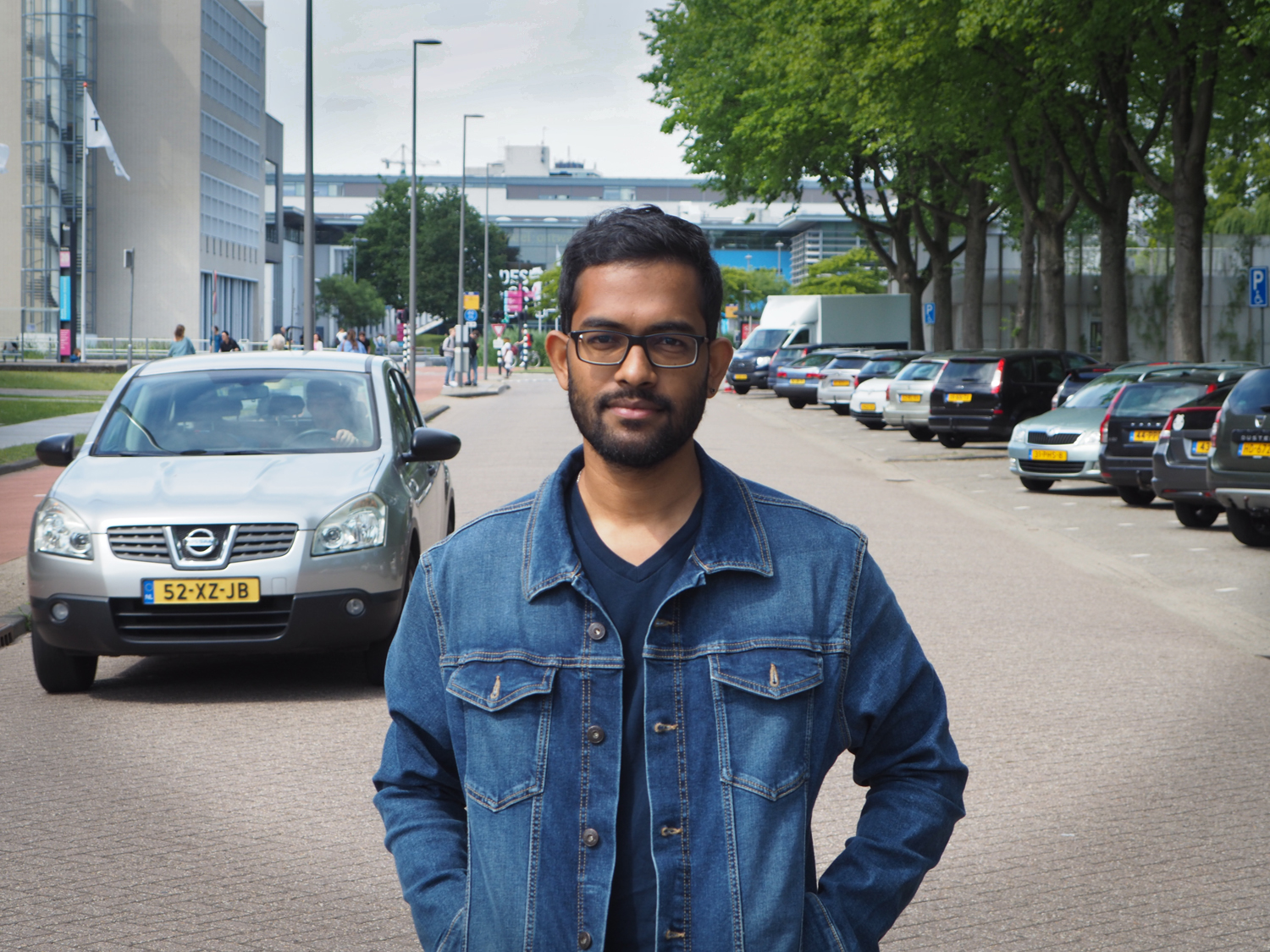The first to graduate as a TU Delft Robotics Engineer is Srimannarayana Baratam. He has a mission: making traffic in India safer with affordable automotive perception systems.
Robotics Engineer Srimannarayana Baratam wants to make traffic safer by making automotive perception modules affordable. (Photo: Jos Wassink)
Before coming to TU Delft, Sriman, as his friends call him, worked as a Territory Service Manager for Maruti Suzuki Ltd. in India. One of his tasks was to investigate car wrecks. In doing so, he was confronted by casualties and orphaned families. He became motivated to strive for better road safety in developing countries where infrastructure is often poor. Sriman wanted to integrate his knowledge of mechanical engineering (his Bachelor from the Birla Institute of Technology, Mesra) and the electronics and computer science domains since “the best solutions integrate all three.” He decided to explore the field of robotics and mechatronics by doing a Master’s in Robotics at TU Delft. Last week, on 28 June 2022, he graduated cum laude as the first of his year.
When you started your study, TU Delft was in lockdown. What was that like?
“The first year was largely online due to Covid. I would have loved to see more in-person interaction, but then TU Delft couldn’t do anything about it itself. In the first quarters they introduce you to the tools that you would definitely need to solve the problems that you are introduced to in the subsequent quarters. To learn the tools is as important as learning about the problems. And frankly, I had very little knowledge about open-source software and coding before coming here. One can say that I pretty much started from scratch. Towards the second half of the year, there are courses which introduce you to the application domains. Whether it’s planning, perception or human-robot interaction or other subjects.”
What topic did you choose for your thesis?
“I decided to focus on scanning the environment and the affordable and reliable detection of objects. I knew that I was going to work with something like radar and cameras together. Radar used to be an expensive technology, but it has become surprisingly cheap. Now it’s one of the most affordable sensors in the automotive industry. You can tune the range up to 80 metres.”
What about your supervisor?
“My main supervisor is Professor Dariu Gavrila. He leads the intelligent vehicles research group at TU Delft. He worked at Daimler for more than two decades and much of his work has been commercialised in Mercedes Benz cars. He not only focuses on research but also sees to the adaptability and feasibility of technologies. But he’s not an easy guy to impress. I had really good grades in my first year and a strong motivation for the topic, which helped in his acceptance to supervise me.”
How far did you come in developing a low-cost automated detection system?
“What’s needed is a technology that is affordable, tough and that fits well into the car. That’s where radar and cameras come into the picture. But these should perform as well as the more expensive LiDAR technology. With a data set of the Delft inner city, I’ve proven that radar plus camera provides competitive if not better results than lidar-based detections in urban scenarios.”
Does it also work in unknown environments?
“My architecture can adapt to new environments quite quickly with minimal training. If I would take the network that has been trained on Delft and took it to Amsterdam it is still likely to work. But if I then take it to the United States for example, I think I would have to adapt my neural network. I don’t use street maps or prior data. My detection purely relies on live scanning.”
What’s your next step?
“My whole idea was to make affordable perception available to everyone. I think I will explore options where I can really develop affordable perception. I want car users in India to drive more safely with the help of an intelligent perception system. At the moment, cars equipped with such systems are mostly at the high end of the market. Road safety however shouldn’t be a privilege; it should be affordable to all.”
- The Robotics Master at TU Delft started in 2020 and drew 101 students, and another 109 students who enrolled in 2021, says Joost de Winter, the Robotics Master’s Coordinator. Around half the students (47%) hold a BSc in Mechanical Engineering or Aerospace Engineering (10%). A quarter of them (27%) are international students, and 8% comes from universities for applied sciences.
Do you have a question or comment about this article?
j.w.wassink@tudelft.nl


Comments are closed.